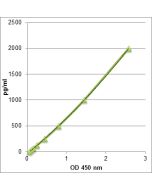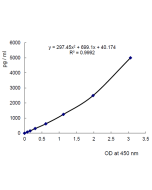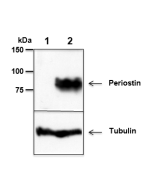Cookie Policy: This site uses cookies to improve your experience. You can find out more about our use of cookies in our Privacy Policy. By continuing to browse this site you agree to our use of cookies.
AdipoGen Life Sciences
Periostin (human) (rec.)

| Product Details | |
|---|---|
| Synonyms | Osteoblast-specific Factor 2; OSF-2; Postn |
| Product Type | Protein |
| Properties | |
| Source/Host | HEK 293 cells |
| Sequence |
Human periostin (aa 22-779) (isoform 2) is fused at the C-terminus to a FLAG®-tag. |
| Crossreactivity | Human |
| MW | ~75kDa |
| Purity | ≥95% (SDS-PAGE) |
| Endotoxin Content | <0.01EU/μg purified protein (LAL test; Lonza). |
| Concentration | 0.1mg/ml after reconstitution. |
| Reconstitution | Reconstitute with 100μl sterile water. |
| Formulation | Lyophilized. Contains PBS. |
| Other Product Data |
Uniprot link Q15063: Periostin (human) FLAG is a registered trademark of Sigma-Aldrich Co. |
| Shipping and Handling | |
| Shipping | BLUE ICE |
| Short Term Storage | +4°C |
| Long Term Storage | -20°C |
| Handling Advice |
After reconstitution, prepare aliquots and store at -20°C. Avoid freeze/thaw cycles. Centrifuge lyophilized vial before opening and reconstitution. PBS containing at least 0.1% BSA should be used for further dilutions. |
| Use/Stability |
Stable for at least 6 months after receipt when stored at -20°C. Working aliquots are stable for up to 3 months when stored at -20°C. |
| Documents | |
| MSDS |
 Download PDF Download PDF |
| Product Specification Sheet | |
| Datasheet |
 Download PDF Download PDF |
Periostin is a 90-kDa matricellular protein that consists of a typical signal sequence, followed by a cysteine-rich region, an EMI domain (protein-protein interactions), four tandem fasciclin-like domains that are responsible for integrin binding, and a C-terminal region. Periostin was originally isolated as an osteoblast-specific factor that functions as a cell adhesion molecule for pre-osteoblasts and in osteoblast recruitment, attachment and spreading. Periostin is also involved in many fundamental biological processes such as cell proliferation, cell invasion and angiogenesis. Periostin expression is increased by both transforming growth factor β1 (TGF-β1) and bone morphogenetic protein 2 (BMP-2). Changes in periostin expression are commonly detected in various cancers and pre-cancerous conditions, and periostin may be involved in regulating cancer cell activities that contribute to tumorigenesis, cancer progression and metastasis. Periostin has shown to be involved in many aspects of allergic inflammation, such as eosinophil recruitment, airway remodeling, development of a Th2 phenotype and increased expression of inflammatory mediators. It is evaluated as a biomarker for bronchial asthma and airway inflammation.









